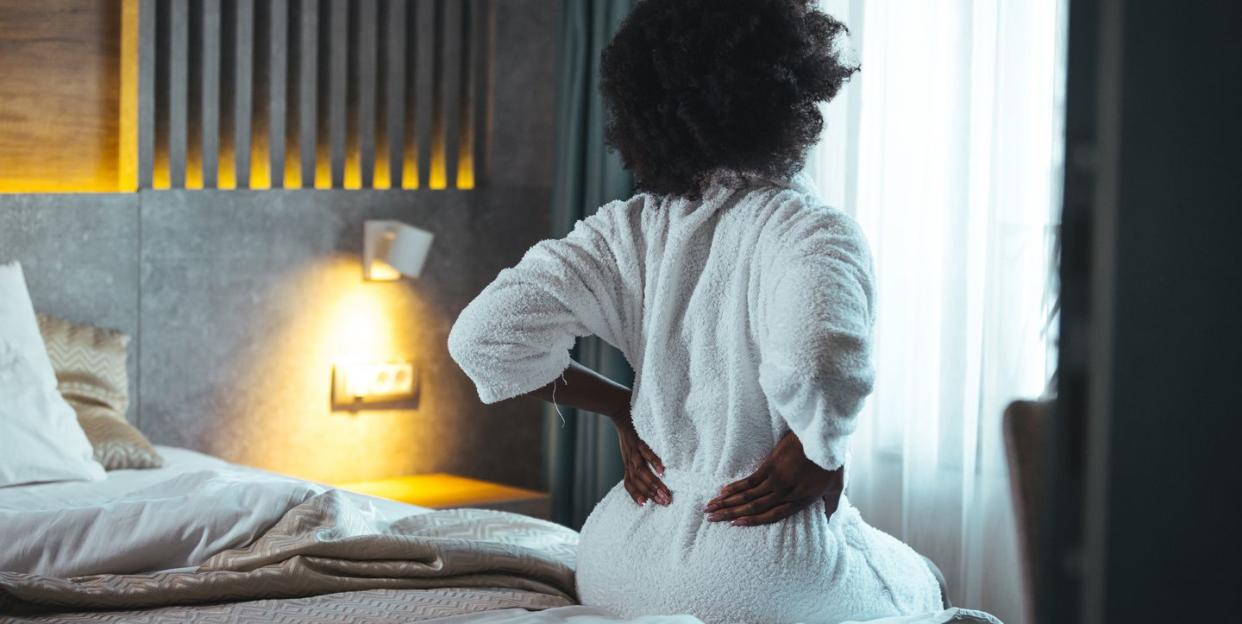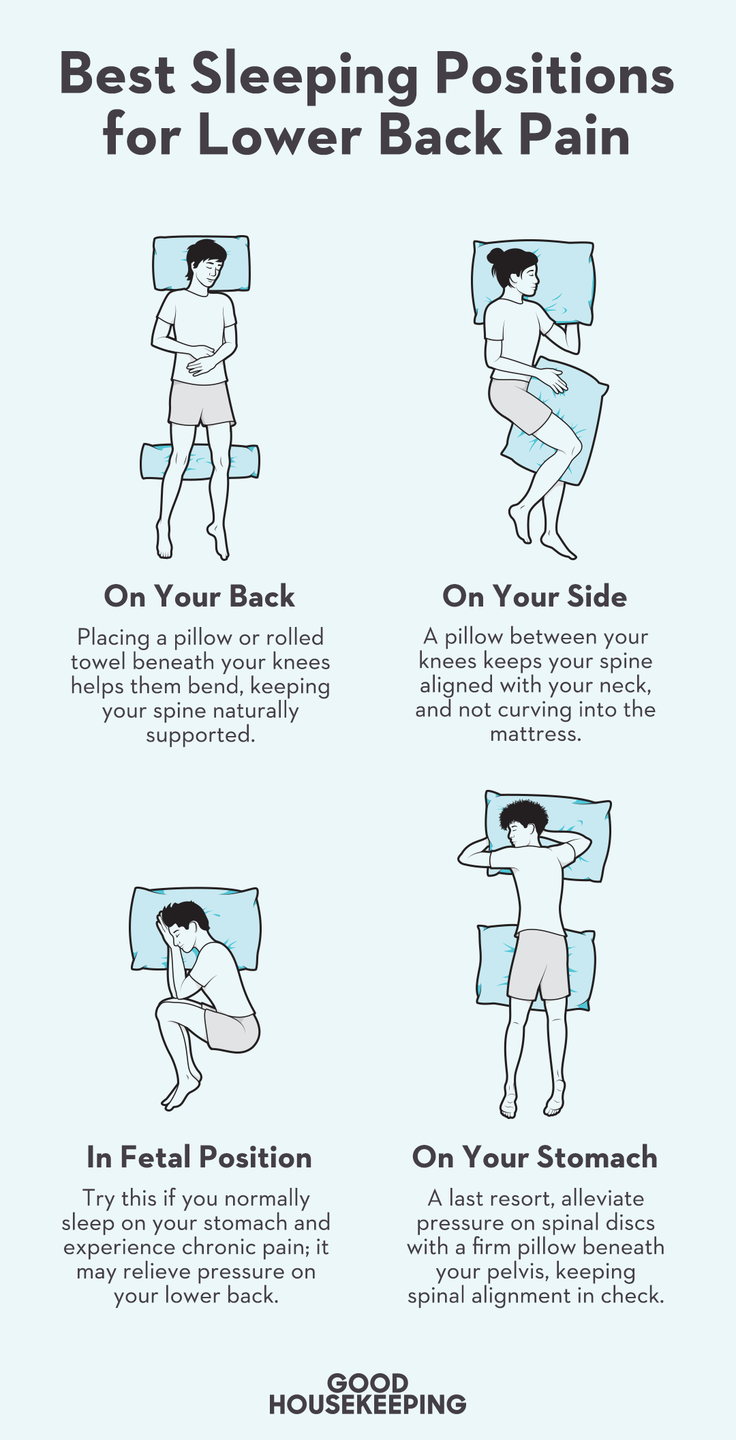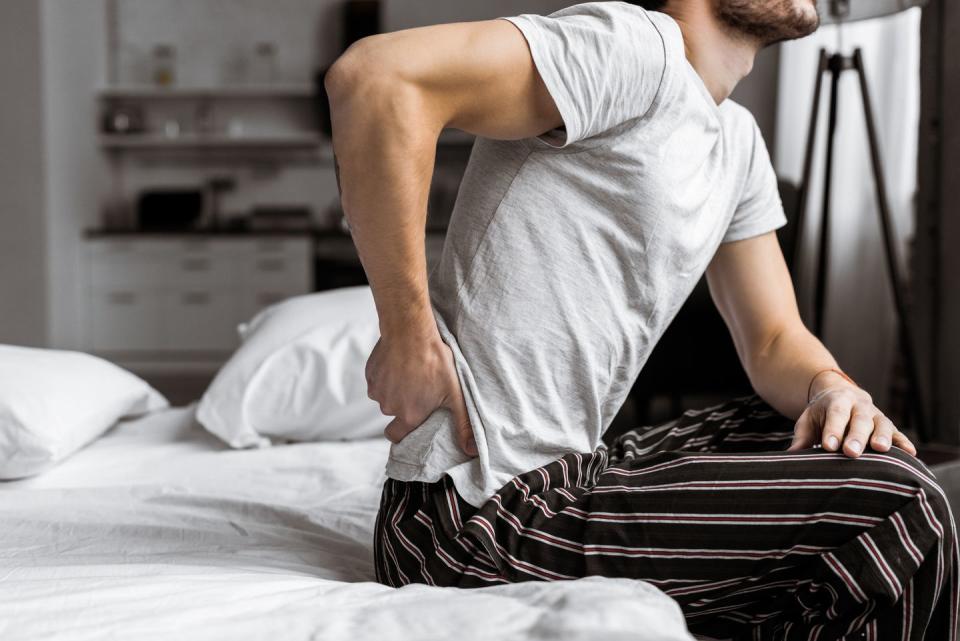Experts Reveal the Worst Sleeping Position If You Have Lower Back Pain

"Hearst Magazines and Yahoo may earn commission or revenue on some items through these links."
Of all the reasons that over half of U.S. adults report as causing them trouble sleeping, lower back pain may be the most consistent, nagging and seemingly impossible to fix. But there's a good chance you may simply be unaware of a solution that can provide relief in the near future — after all, around 8 in 10 people experience chronic back pain that requires medical intervention, which means healthcare providers have spent considerable time troubleshooting what exactly is causing your lower back to keep you up at night.
The lower back is made up of an intricate network of muscles and nerves, all anchored by what's known as the lumbar section of your spine, which anchors your body weight and plays a large role in movement. As people age, it's entirely normal for this particular area to experience what's known as "degenerative" changes that are a result of everyday life; wear and tear on the ligaments and vertebrae of the spine itself, says Wesley Bronson, M.D., MSB, an orthopedic spine surgeon at The Spine Center at Mount Sinai Hospital. More often than not, injuries you've sustained (including ones that may seem minor and go untreated!) can influence the risk of developing lower back pain.
It's also true that many people make lifestyle choices that may allow minor lower back pain to flare up during bedtime. While the position you choose to lie down in doesn't really feel like a "choice" for most, actively repositioning yourself may play a big role in improving back support in the long run. And the kinds of bedding you use — as well as the mattress itself — can hinder or help the efforts you make to enjoy uninterrupted sleep throughout the night.
Addressing back pain can feel like a full-time job, but it'll be worth it: Low back pain can become more severe the longer it is unaddressed, and may graduate from making bedtime uncomfy to keeping you awake all night long. Some are able to address the root issue of their sleep-induced lower back pain by reexamining their sleeping habits and the actual bed itself, working to appropriately cope with pain in the meantime. But more individuals are able to achieve quality sleep by having a well-intentioned conversation with the right doctor, coming up with solutions that can help you recover from back pain in the long run.
Why is back pain worse when I sleep at night?
Healthcare providers have indicated that sleep quality and low back pain may be linked in a two-way relationship. Lower back pain can certainly be triggered outside of the bedroom, inevitably causing you to lose sleep at night due to discomfort — but it may also be prompted by the way that you sleep and the kind of bedroom you sleep in, which then carries over into daytime.
Dr. Bronson says chronic low back pain (which occurs consistently for 3 months or longer) can stem from a myriad of reasons; most commonly, aging. "As patients get older, the spine naturally starts to degenerate a bit; the discs themselves start to lose some of their water content, they start to dry out a bit and that leads to a cascade of changes in the spine. That's equivalent to arthritis in the lower back, and that's natural aging, no different than getting gray hair or wrinkles," he explains, adding that doctors refer to this process as spondylosis. "This causes discomfort and pain, with disc degeneration, alongside arthritis in the low back in the facet joints."
Other common causes of low back pain can involve a disc herniation — when a disc in your spine has begun to crack, or fluid within the disc has leaked causing additional pressure on your nerves, Dr. Bronson says — as well as sciatica and even potential scoliosis. All of these conditions may be particularly exacerbated when you lay down to sleep, despite not being caused by sleeping itself. "Any of those [conditions] can cause a constellation of back pain or neurologic symptoms, and these represent only a portion of the height of things that can go wrong," he adds.
But for those without injuries or pre-existing back issues, the way you sleep in bed at night could be causing you pain all throughout the next day — and making those who have bad backs experience a whole lot more pain in the end, says Ashish Sahai, M.D., FAAOS, a spine surgeon at Palm Beach Health Network's West Boca Medical Center.
"The most common cause of lower back pain, particularly related to poor sleeping habits, is sleeping position. After that, lower back pain may stem from not rotating certain mattresses at appropriate intervals — or failing to replace an old mattress when it's time to get a new one," Dr. Sahai tells Good Housekeeping.
Which positions should I sleep in if I am experiencing lower back pain?
Sadly, there isn't one universal sleeping position that works to alleviate back pain for everyone — it may require a bit of trial and error when it comes to finding a sleeping position that supports your spine and back muscles. And that's the majority of the battle; deliberately changing the way you sleep is a very hard task, and many people suffer through even greater disrupted sleep in order to correct poor sleeping posture.
The best sleeping positions for lower back pain:
The best position for most sleepers is one that is neutral — and per most spine experts, that's sleeping on your back.
"Sleeping on your back with a pillow under the neck that's not too large, and some sort of pillow or rolled towel, or rolled blanket underneath the knees to give them a little bend" Dr. Bronson explains. "This position tends to be helpful for allowing the spine to take on the normal curvature of the lower back without putting excessive stress on the joints and discs. It tends to put the spine into a comfortable harmonious position."
Other specific positions that may help alleviate or prevent lower back pain:
[accordion id= '41372f50-da35-40e4-af04-8047ec52142b'][/accordion]

The worst sleeping position for lower back pain:
As comfortable as it seems for some, sleeping on your stomach without a pelvic pillow can do the most damage to your spine over time. "Sleeping on your stomach tends to flatten the spine. It reduces the normal curvature, and can put a little more excessive stress on some of the joints in the lower back," Dr. Bronson explains. "Stomach sleeping is probably the least desirable way to sleep in bed, not just for your back but also for stiff, strained necks — unless you want your face stuffed into a pillow, you're forced to turn your head 90° to the side."
"So not only are you not putting your lower back into a supportive position, but you're also putting your neck into a pretty uncomfortable position," he adds.
Can a mattress cause lower back pain while sleeping?
"Experiencing lower back pain first thing in the morning can be indicative of a bad mattress, or a bedding issue — but it's not always the case," explains Dr. Sahai. "There are many factors that often contribute to back pain, including poor posture and underlying medical conditions; stress, even." Some of these medical conditions include issues like seronegative spondyloarthropathy or ankylosing spondylitis.
How do you know if your bed is causing your back pain, you may ask? It all has to do with whether or not the bed you're currently sleeping in provides a good foundation for spinal alignment. If your mattress, or any aspect of your bed, is causing you to spend too much time lying in a position that doesn't support the natural curve of your body — that's when lower back pain starts to build, often at a slow creep over time.
Because mattress support is key, many bed manufacturers include information about rotating or flipping mattresses to ensure its structural integrity is maintained. "Rotating and flipping your mattress can be helpful for relieving back pain, but the intervals may vary depending on the type of mattress you have," says Dr. Sahai, adding that many manufacturers list their guidelines clearly for customers to consider.
Spending too much time on your mattress, especially for activities other than sleeping, may lead to a decline in its support or throw your posture out of whack. This is especially crucial for those with lower back pain that feels debilitating; additional bed rest is not the solution, as physical movement and mobility are required to establish what's known as spinal stability. "When it comes to managing back pain, it's important to limit the use of your bed to sleeping and intercourse only. This will help reduce wear and tear on your mattress, especially if it has springs," Dr. Sahai stresses.
Buying a new mattress shouldn't be your very first resource if you're troubleshooting lower back pain after sleeping, especially before considering physical aspects that may be impacting your overall muscular health. But if you are considering a new option after exhausting other tips, our mattress experts in the Good Housekeeping Institute recommend memory foam mattresses or hybrid mattresses, as these beds offer pressure relief around hips and shoulders. There is some evidence that suggests that switching out a mattress for better support can alleviate pain and stiffness by upwards of 60%, per a medical survey published in the American Journal of Physical Medicine & Rehabilitation.

How sleep hygiene may improve lower back pain at bedtime:
Working on finding a more supportive sleeping position is important, as well as analyzing whether or not your mattress is in optimal condition. But the decisions you make around bedtime may be indirectly affecting whether or not you are setting yourself up for a good night's sleep, especially if you are already experiencing back pain.
Practicing good sleep hygiene is crucial if you're unable to determine whether back pain is keeping you up at night, or if rolling around restlessly contributes to back pain in the morning; it's a bit of a conundrum, as it can be a cyclical issue. "If patients don't get very good sleep, their restlessness at night likely exacerbates their back symptoms; and as their back symptoms get worse, they don't sleep well the following night because of it," Dr. Bronson says.
What is good sleep hygiene, you may wonder? It has to do with making calculated decisions that allow your body to be lulled to sleep naturally, and to keep the bedroom a sound place for interrupted sleep. Practicing a steady bedtime is a big part of this process, as is the following:
[accordion id='e737cb33-2cfd-4377-a231-3bbd68a1187c'][/accordion]
"Don't work while you're in bed; you're not going to sleep very well this way. Try not to watch too much TV in bed, either," Dr. Bronson advises. "So really, just work to keep your bed for sleeping to teach your body that it's actually time for sleep. These tactics go a long way to getting better sleep, and then subsequently improving back pain as well. Everyone just hurts a little bit when they don't get good sleep."
How to relieve lower back pain in bed fast:
If you're experiencing what's known as acute back pain (meaning, pain that's new and relatively localized in your lower back) turning to over-the-counter pain medication or ice packs and cold compresses can provide relief for most one-night instances. Be sure to follow the manufacturer's dosing directions and monitor yourself to see if the pain progresses.
But adjusting your sleeping position and potentially flipping, rotating or replacing your mattress is the first solution for someone who is experiencing chronic lower back pain, made worse when sleeping in bed. Dr. Bronson says that a majority of people can relieve pain through education and adjustment, over time — but if these solutions don't provide relief in a few weeks' time, turning to non-operative treatment in the form of physical therapy may help.
"Physical therapy is remarkably helpful at improving symptoms of low back pain. For patients who have pain that isn't resolving whether or not there's an identifiable cause, some physical therapy — whether that's formally going to a clinic or even self-directed therapy, which works the muscles and their core and the lower back to strengthen those muscles — tends to go a long way to resolving the overwhelming majority of symptoms long before someone finds their way into my office," explains Dr. Bronson.
When to see a doctor about lower back pain during sleep:
If your lower back pain has become so severe that you can't conduct a normal routine whatsoever, it's time to seek out medical help immediately. Seeing a doctor is crucial even if you are under the age of 40, where inflammatory back pain that only worsens at night may signal a larger problem known to doctors as inflammatory axial spondyloarthropathy. Stiffness and painful sensitivity that lasts for up to an hour first thing in the morning shouldn't be ignored by anyone, even those at a younger age. Your primary care doctor is a great place to start, but they likely will refer you to a spine specialist after they've ruled out a few pre-existing medical conditions.
Per materials published by Johns Hopkins Medicine, you should seek immediate medical attention if:
Your lower back pain stems from a known physical injury to the area
Pain worsens for more than a few days despite efforts to resolve it
Pain radiates down to your legs or other parts of your abdomen
Pain includes numbness in your lower back or other surrounding areas
You are experiencing a fever, localized warmth, redness, or other signs of infection
You are experiencing other concurrent issues like urinary problems or weight loss
If you aren't seeing improvement at any time, a medical specialist can help locate the root issue that's causing your lower back pain, Dr. Bronson stresses. "It shouldn't just get attributed to a mattress, and then if patients aren't getting better, they just continually allow themselves to experience back pain; either a primary care physician or a spine specialist can provide a thorough evaluation of their specific cause of low back pain."
You Might Also Like

